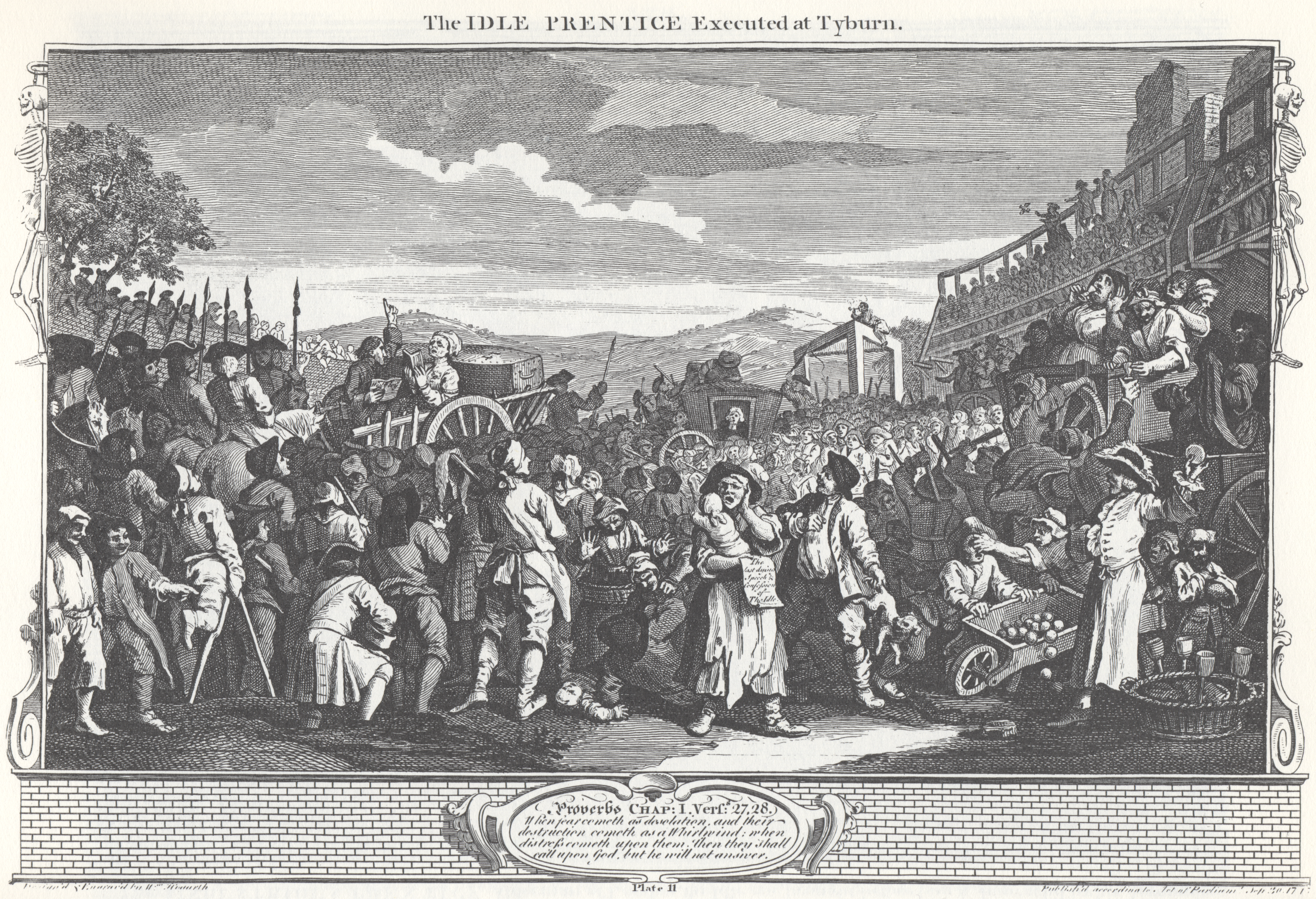KLAGTEN van een Deserteur, over de valsche liefde staande voor den kogel
- Ballad Title
- KLAGTEN van een Deserteur, over de valsche liefde staande voor den kogel
- Indicated Tune
- Van den Bamboucheur
- Ballad Location
- Amsterdam Meertens: Lbl Meertens 06101, song number 2
- Background Information
- Complaints of a deserter, about the false love, standing in front of the bullet.
- Printing Date
- [1840 ca.]
- Printing Location
- s.l.
- Printer Name
- s.n.
- First Line
- Leert aan mij jonkheid Hoort hoe dat ik ben gevaren
- Relevant Countries
- Netherlands
- Category
- Crime and Punishment Ballads
- Sub-Category
-
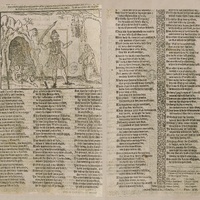 Execution Ballads
Execution Ballads
- Language
-
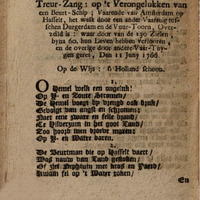 Dutch Ballads
Dutch Ballads
- Notes
-
Translation notes:
[1] ‘steek’ here refers to the saying ‘in de steek laten’ i.e. ‘leave behind’ or ‘abandon.’ This saying has a specific military connotation where it means ‘to abandon in battle’ as well as ‘abandoning one’s comrades and/or leaders.’
[2] ‘staat’ refers to state, status, or condition. The implied meaning here is that true love is not an important ‘state’ for women, i.e. it does not matter.
[3] ‘nood’ refers to the speaker’s anguish (both physically and mentally) which he experiences right before his death. In Dutch the word also encompasses a sense of emergency, pressure, sad conditions, and violence or force done against him.
- Other Media
-
 Translation: KLAGTEN van een Deserteur, over de valsche liefde staande voor den kogel
Translation: KLAGTEN van een Deserteur, over de valsche liefde staande voor den kogel - Media
-
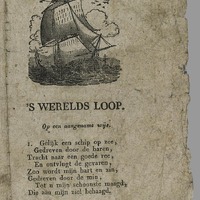 KLAGTEN van een Deserteur, over de valsche liefde staande voor den kogel 1
KLAGTEN van een Deserteur, over de valsche liefde staande voor den kogel 1 -
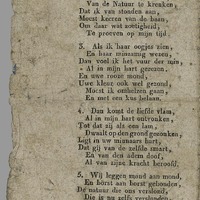 KLAGTEN van een Deserteur, over de valsche liefde staande voor den kogel 2
KLAGTEN van een Deserteur, over de valsche liefde staande voor den kogel 2 -
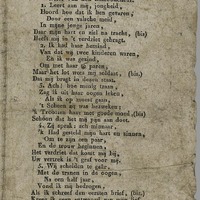 KLAGTEN van een Deserteur, over de valsche liefde staande voor den kogel 3
KLAGTEN van een Deserteur, over de valsche liefde staande voor den kogel 3 -
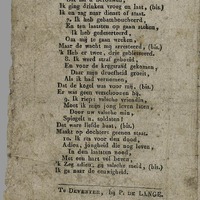 KLAGTEN van een Deserteur, over de valsche liefde staande voor den kogel 4
KLAGTEN van een Deserteur, over de valsche liefde staande voor den kogel 4 -
 Translation: KLAGTEN van een Deserteur, over de valsche liefde staande voor den kogel
Translation: KLAGTEN van een Deserteur, over de valsche liefde staande voor den kogel
Dutch transcription currently unavailable, English translation by Rena Bood.
TRANSLATION:
1. Learn from me, young people,
Hear how my left went,
Because a false girl,
In my young years,
That which my heart and soul sought,
Has brought me into sorrow.
2. I had loved her,
From when we were two children,
And I was minded,
To pair with her,
But fate appointed me a soldier,
Which brought me in this state.
3. Oh! How many a tear,
I saw leak out of her eyes,
When I had to leave,
It appeared that she had collapsed;
I comforted her with good cheer,
Because it hurt me.
4. She spoke: oh lover,
I had settled my heart and mind,
To be a pair,
And to begin marriage.
The sadness, it comes to me,
Your departure is my grave.
5. We readily separated,
With tears in the eyes,
After half a year,
I found myself deceived,
When I wrote the first letter,
I did not receive an answer from my love.
6. Then I heard;
That that false girl was going to marry,
I then called out unsettled:
That it would grieve you,
I went drinking early and late,
I [] to service or state.
7. I have caroused,
And finally to abandon [my comrades],[1]
I have deserted
To exact my vengeance,
But the guard arrested me,
I have injured two or three.
8. I was tightly bound,
And came before the war council,
There my sadness grew,
When I heard,
That the bullet was for me,
There was no mercy.
9. I called: false friend,
Must I leave my life young,
Because of your false love,
Reflect yourselves, soldiers!
That true love avails,
Does not matter[2] to daughters.
10. I stand before death,
Adieu, youth who still live,
In the final sad moment,[3]
My heart full of fear,
I say, adieu, you false girl,
I go to eternity.
[1] ‘steek’ here refers to the saying ‘in de steek laten’ i.e. ‘leave behind’ or ‘abandon.’ This saying has a specific military connotation where it means ‘to abandon in battle’ as well as ‘abandoning one’s comrades and/or leaders.’
[2] ‘staat’ refers to state, status, or condition. The implied meaning here is that true love is not an important ‘state’ for women, i.e. it does not matter.
[3] ‘nood’ refers to the speaker’s anguish (both physically and mentally) which he experiences right before his death. In Dutch the word also encompasses a sense of emergency, pressure, sad conditions, and violence or force done against him.
Part of KLAGTEN van een Deserteur, over de valsche liefde staande voor den kogel
